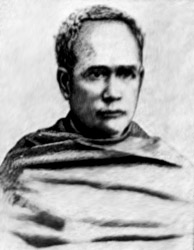 Career of Vidyasagar
Ishwar Chandra Vidhyasagar was a visionary whose only aspiration was to build a society of cultured young men and women who would be better qualified by their writings and teachings. He anticipated that the youth would disseminate sound information world-wide. For this reason he worked hard to educate young people. On 29th December 1841 Ishwar Chandra took a job as head pundit, the Principle lecturer (Sanskrit teacher) at Fort William College. G. T. Marshall who was the Secretary of the College at the time acted as the catalyst for gaining this prestigious position for him at the age of 21. Marshall had been thoroughly impressed by Ishwar`s scholastic achievements.
Career of Vidyasagar
Ishwar Chandra Vidhyasagar was a visionary whose only aspiration was to build a society of cultured young men and women who would be better qualified by their writings and teachings. He anticipated that the youth would disseminate sound information world-wide. For this reason he worked hard to educate young people. On 29th December 1841 Ishwar Chandra took a job as head pundit, the Principle lecturer (Sanskrit teacher) at Fort William College. G. T. Marshall who was the Secretary of the College at the time acted as the catalyst for gaining this prestigious position for him at the age of 21. Marshall had been thoroughly impressed by Ishwar`s scholastic achievements.
In 1846 he joined Sanskrit College as Assistant Secretary. Along with his Sanskrit College position, the government entrusted him in 1855 with the added responsibility of Special Inspector of Schools for the districts of Hughli, Burdwan, Midnapore and Nadia. He was also an honorary office bearer of several organisations including ASIATIC SOCIETY and BETHUNE SOCIETY. Vidyasagar traveled all over Bengal in the capacity of Inspector of Schools. This gave him the opportunity to witness the pervading darkness and superstition amongst the illiterate, uneducated masses of Bengal. He was so distressed by all the malpractices he saw and esp. the exploitation of women in the name of religion, that he hurriedly established 20 Model schools in a short period of only 2 months.
He realised that unless women of the land were educated, it was impossible to emancipate and liberate them from the terrible burden of inequalities and injustice imposed on them by the oppressive Hindu society blinded by false beliefs and derelict customs. He worked relentlessly and opened 30 schools for girls in Bengal. In order to promote the education of girls, Vidyasagar made door to door calls, requesting parents to send their daughters to schools.
As Special Inspector of Schools, Vidyasagar also used his position to encourage landholders and other wealthy people to establish educational institutions. Within his inspection zone, he was instrumental in founding many schools, several of which were for girls. Some schools were established at his own initiative and with his financial support. Vidyasagar`s philanthropy was proverbial. It is said that half the money that he got from his salary and the royalties of his published books was kept reserved for helping the distressed.
His well documented protests against the then Education Department officials testify the degree of intensity with which he pursued the course of educational reforms. He favored English and Bengali as a medium of learning alongside Sanskrit and wanted to offer students a wide range of subjects. He wanted to broaden their horizons in studying and analyzing European and Indian conceptual practices so that they could judge for themselves and discover the ultimate truth.
He was not afraid of discarding erroneous beliefs of Indian shastras and preferring European science wherever appropriate. But he also did not blindly accept everything. He had an open mind for discovering the truth and truth alone, with an unshakable determination.
In 1858, he was made one of the first fellows of the Calcutta University. He received a certificate of Honour at the Imperial Assemblage in January 1877. A year later in1847 he and his friend Madan Mohan Tarkalankar set up the Sanskrit Press and Depository, a print shop and bookstore on Amherst Street in north Calcutta with a loan of six hundred rupees. His first titles were Bharatchandra Ray`s "Annadamangal Kavya" for which his copy-text was a rare manuscript owned by the Krishnanagar zamindars, and the "Betal Panchabingshati" (Twenty Five Tales of a Demon), traslated from the Sanskrit epic "Kathasaritsagar". In 1849 his partner Madan Mohan Tarkalankar began an illustrated series for children, "Shishu Shiksha".
The success of the Sanskrit Press was extremely important for Vidyasagar, since he lacked ancestral or personal wealth and had to support himself as well as find money for his campaigns. It also gave him an instrument through which he could speak to Bengal, and it magnified his words and distributed them cheaply to every child in the land. In 1859, the Calcutta Training School had been set up and in 1864 Vidyasagar became its director. It was renamed the Hindu Metropolitan Institute and in 1872 it was granted the status of a college. Today it is a university named after its greatest benefactor -- Vidyasagar University.




















